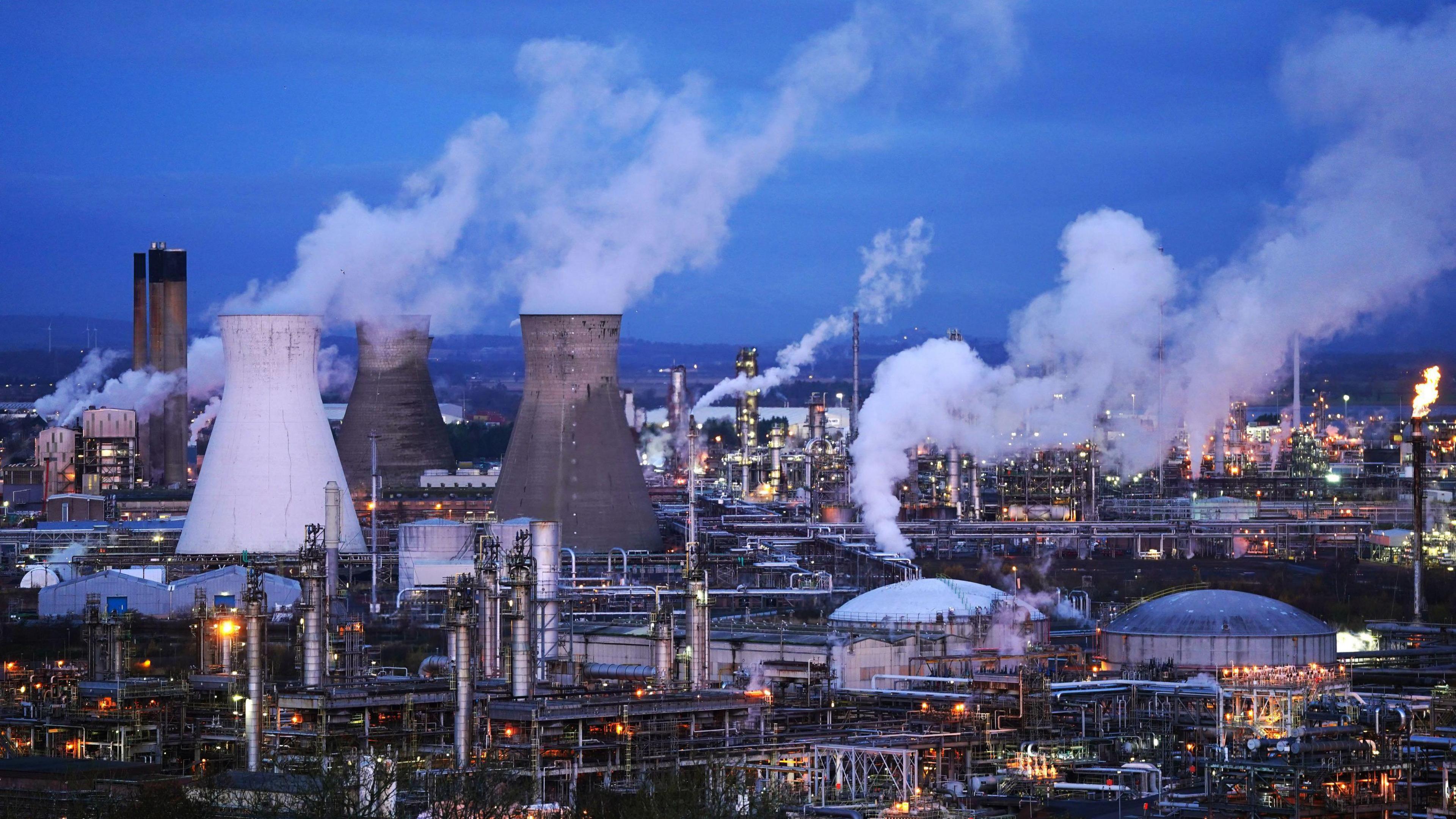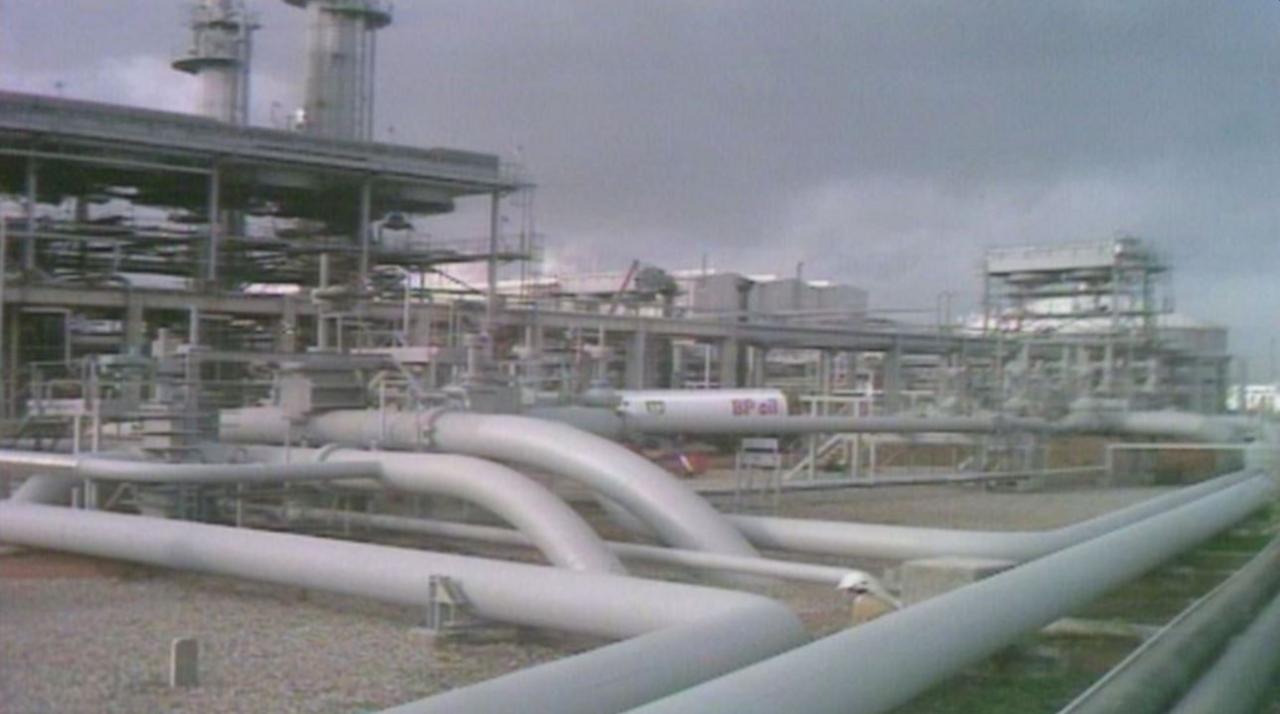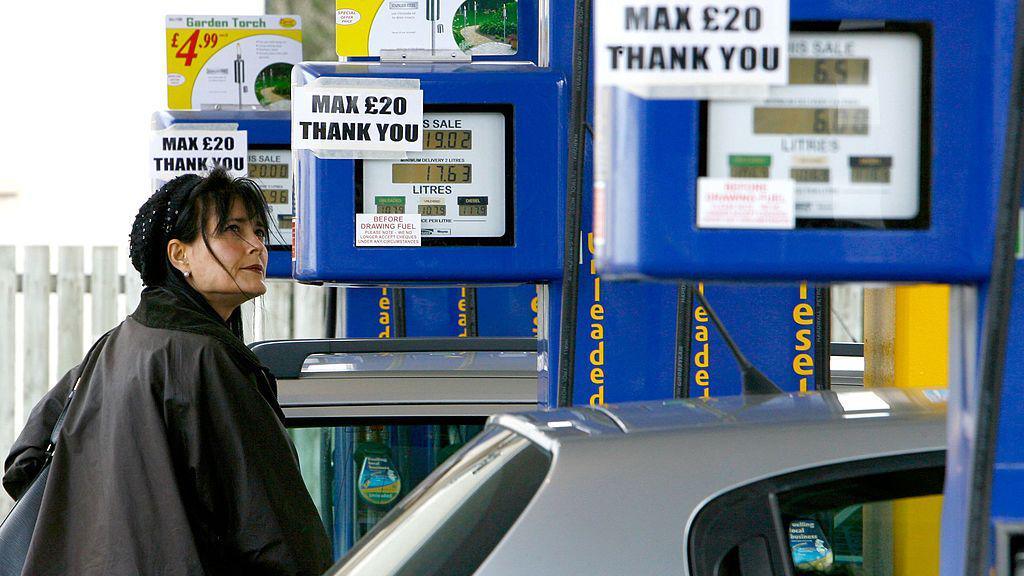What might the future hold for Grangemouth?

- Published
With energy high on the new Labour government’s agenda, and Scotland the first pit stop on Keir Starmer’s tour of the UK nations, people are now talking about the future of Grangemouth.
The site near Falkirk is home to one of the first oil refineries in the UK, which is still a major supplier of aviation and ground fuels across Scotland.
Owner Petroineos intends to cease refinery operations by 2025 and turn the site into a fuels import terminal – a move that would result in 400 job losses.
Those plans were announced in November - but we now have 37 newly-elected Scottish Labour MPs, many of whom represent areas in the Central Belt.
They will feed Sir Keir Starmer’s majority government, which has promised to set up a publicly-owned energy company headquartered in Scotland – the location for which has not yet been revealed.
This alignment has prompted questions over whether Grangemouth would be a suitable home for the energy industries of the future.
Grangemouth: A brief history

The Forties Pipeline - which carries crude oil from sea to land - opened in 1975
The oil refinery was opened by BP in 1924, the company having been persuaded by Grangemouth’s transport links and availability of local skilled labour.
It maintained a throughput of 360,000 tonnes per year but was forced to close after the outbreak of war in 1939 as oil imports dwindled.
It reopened from 1946 and grew over the 1950s to meet demand for petrochemicals and fuels.
British Petroleum Chemicals, which was established in 1947 to research petrochemicals, decided to locate its site next to the refinery.
Grangemouth: 100 years in the oil industry
- Published22 November 2023
How an oil refinery dispute flared up
- Published16 October 2013
Then in the 1970s, a new source of crude oil feedstock in the shape of North Sea oil brought further business - and the opening of the Forties pipeline.
The 235-mile line carries crude oil from North Sea installations to the nearby Kinneil terminal and relies on the Grangemouth refinery for steam and electricity to function.
In 2005 the site was bought by Ineos - a company owned by Britain's richest man Sir Jim Ratcliffe - in a £5bn takeover.
Disputes soon began with the Unite union over plans to end a final salary pension scheme for new workers at the plant, resulting in a strike in 2008. It was the first time production had completely halted and brought fears over petrol shortages.

A petrol station near Grangemouth in 2008, days into the stirke
Another dispute in 2013 led to Ineos shutting down the plant and issuing revised terms and conditions, including ending the final salary pension scheme and cutting shift allowances.
This was coupled with a survival plan which included a £300m investment to keep the site open. It was ultimately accepted by the union.
Ineos announced with great fanfare the arrival of the first shipment of shale gas - which can be recovered through fracking - from the US in 2016.
After the Scottish government's fracking consultation the following year, an "effective ban" was put in place. Ineos and another petrochemical firm sought a judicial review, but lost in court.
In February 2019, Ineos announced £1bn worth of investment in the UK which included building a £350m energy plant at Grangemouth, and £500m for overhauling the Forties pipeline.
Why is Grangemouth's future in doubt?

Climate activists staged a number of protests at Grangemouth last summer
While the petrochemical plant is wholly owned by Ineos, the refinery is owned by Petroineos - a joint venture between Ineos and PetroChina.
It is currently the primary supplier of aviation fuel for Scotland's main airports, and a major supplier of petrol and diesel ground fuels across the Central Belt.
Petroineos announced its intention to shut down the refinery in November, saying Grangemouth had been facing significant challenges because of global market pressures.
Climate Camp Scotland - who were among the environmental activists staging protests at the site last summer - said the plans were a "damning indictment of a market-led transition away from fossil fuels".
How many people work at the site?
About 2,000 people are directly employed at the site including 500 at the refinery, 450 on the Forties pipeline from the North Sea and a further 1,000 in the Ineos petrochemicals business.
Some 100 staff would be needed for the planned fuels import terminal - which Petroineos said would be able to import petrol, diesel, aviation fuel and kerosene into Scotland.
It said the timescale for the transition had "not yet been determined", but the work was expected to take about 18 months.
Petroineos also said it was working closely on the project with a "range of interested parties", including the Scottish and UK governments, and said it would provide more information in due course.
Trade union Unite has said it would "leave no stone unturned" in its fight to save jobs at the site.
What do politicians say?

Prime Minister Keir Starmer discussed Grangemouth with First Minister John Swinney on Sunday
The issue is making headlines again because it came up in discussions between Sir Keir Starmer and First Minister John Swinney, during the Labour leader's first visit to Scotland as prime minister.
Mr Swinney said they had committed to working collaboratively on areas of “common ground”, including growing the economy and delivering net zero.
Meanwhile Sir Keir promised "immediate" discussions over steps to preserve jobs and ensure Grangemouth's future, which he said was a "real priority".
What would 'GB Energy' mean for Scotland's green economy?
- Published23 June 2024
Days later, the new Scottish secretary Ian Murray said the UK and Scottish Governments had commissioned a £1.5m report to explore options for the sites future.
Speaking to BBC Scotland News, Ian Murray said that governments in London and Edinburgh had been working "hand in glove".
He said: "It’s an incredibly exciting proposal, it gives a big commitment from both governments that we are committed to the long term future of Grangemouth.
"It sends out a very clear message that both governments are working together in the interests of the people in Scotland."
Mr Murray has recently said he believes the Grangemouth site could become a "bio plant" for greener industries, such as sustainable aviation fuel.
A working group, co-chaired by the UK government Energy Secretary Ed Miliband and the Scottish government's acting Energy Secretary Gillian Martin will also co-chair a working group tasked with looking at the future of the plant.
Mr Miliband said the UK government "will leave no stone unturned" in seeking a future for the Grangemouth site.
While, Gillian Martin added the Scottish government's "wish" is for "refining to continue at Grangemouth for as long as practicable".